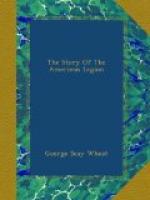MINNESOTA.—Merle
E. Eaton, care of Lee & Lewis Grain Co., 200
Corn Exchange
Bldg., Minneapolis.
MISSISSIPPI.—John M. Alexander, Jackson.
MISSOURI.—Ed. J. Cahill, Service Commission, Jefferson City.
MONTANA.—Ben W. Barnett, Helena.
NEBRASKA.—Allan A. Tukey, 1st National Bank Bldg., Omaha.
NEVADA.—J.D. Salter, Winnimucca.
NEW HAMPSHIRE.—Frank J. Abbott, Manchester.
NEW JERSEY.—George W.C. McCarter, 765 Broad St., Newark.
NEW MEXICO.—Harry Howard Dorman, Santa Fe.
NEW YORK.—Wade H. Hayes, 140 Nassau St.
NORTH CAROLINA.—Charles N. Hulvey, A. & E. College, Raleigh.
NORTH DAKOTA.—Ed. E. Gearey, Fargo.
OHIO.—Chalmers
R. Wilson, Adj. Gen. Office, State House,
Columbus.
OKLAHOMA.—F.W. Fisher, Oklahoma City.
OREGON.—Dow V. Walker, care Multnomah Club, Portland.
PENNSYLVANIA.—George F. Tyler, 121 S. 5th St., Philadelphia.
RHODE ISLAND.—James E. Cummiskey, Crompton.
SOUTH CAROLINA.—Ben. D. Fulton, 32 West Evans St., Florence.
SOUTH DAKOTA.—J.C. Denison, Vermillion.
TENNESSEE.—W.R. Craig, Nat. Life and Accident Co., Nashville.
TEXAS.—J.A. Belzer, Austin.
UTAH.—Baldwin Robertson, 409 Ten Boston Bldg., Salt Lake City.
VERMONT.—Joseph H. Fountain, 138 Colchester Ave., Burlington.
VIRGINIA.—R.G.M.
Ross, 508 First National Bank Bldg., Newport
News.
WASHINGTON.—George
R. Drever, care Adj. Gen. Office, Armory,
Seattle.
WEST VIRGINIA.—Chas.
McCamic, 904 National Bank of West
Virginia Bldg.,
Wheeling.
WISCONSIN.—R.N. Gibson, Grand Rapids.
WYOMING.—R.H. Nichols, Casper.
WHAT THE PUBLIC PRESS THINKS
It is interesting to know what the press of the United States thinks of the American Legion. Practically every newspaper in the country honored the Legion with comment. In almost every instance it was favorable. Selection has been made of some of this comment—as much as is feasible to give here. It is of two kinds: first, what the press thought of the idea of the Legion, and second, what opinion it had of the Legion after it was launched at St. Louis. The first type of comment was made prior to the caucus in this country and the second, afterwards. Comment on both types was generally favorable.
Lest insincerity be charged let it be said here that there was some unfavorable comment. One New England paper was surprised that soldiers, sailors and marines were not clever enough to know that the American people would perceive their attempt, through this organization, to “drive a six mule team through the Treasury” and get pension and pay grabs. One Southern paper pictured Colonel Roosevelt returning from the St. Louis caucus, a defeated candidate for the chairmanship, with all hope of the future blasted, while one in Ohio said with equal accuracy and solemnity that “there is no need of such an organization at this time, now that the country is entering the era of peace.”




